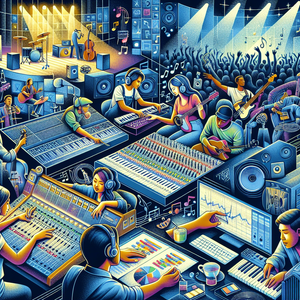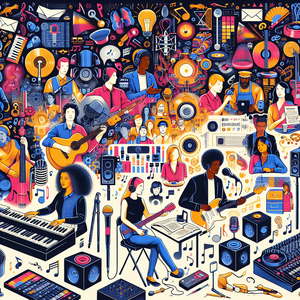
Exploring Career Opportunities in the Music Industry: Roles, Salaries, and Pathways to Success
The music industry is a dynamic and expansive realm that encompasses much more than just performers on stage. With various sectors including recording, management, marketing, and live events, it presents a wealth of career options. This guide delves into an array of job titles, outlining the necessary skills and qualifications for success in each role. While many tend to focus on well-known positions like music producers and artists, it's vital to recognize the importance of unconventional roles, such as music therapists and sound engineers. This diversity reflects the industry's complexity and the numerous pathways available for those passionate about music. Whether you're an avid music lover looking to align your career with your interests or someone keen on the business side of music, this guide will clarify your options and help you navigate the journey of building a successful music career.
Job Summaries:
Music Producer:
- Music producers play a pivotal role in shaping recordings.
- They work closely with artists and sound engineers throughout the entire production process.
- Producers must possess a solid understanding of music theory, technical audio skills, and creative insight.
- A degree in music production or a related field is typically beneficial.
- Hands-on studio experience is also valuable.
- Producers serve as the essential link between artistic vision and technical execution.
- They directly influence the success of recordings.
A&R Representative:
- A&R representatives are responsible for scouting and nurturing new talent.
- Overseeing artist development.
- Selecting songs for albums.
- This role requires strong interpersonal skills.
- An awareness of market trends is necessary.
- A passion for discovering new music is essential.
- While a bachelor’s degree in music business is often desired, industry experience is invaluable.
- A&R representatives play a crucial role in shaping an artist's career.
- Their influence is significant for both the artist and the label.
Tour Manager:
- Tour managers oversee all logistical elements of an artist's tour.
- Managing travel, accommodations, and scheduling.
- Act as the essential liaison among the artist, crew, and venues.
- Ensure smooth operations on the road.
- Strong organizational skills are critical in this role.
- Live event management experience is important.
- Enable artists to focus on their performances while handling the details.
Sound Engineer:
- Sound engineers are responsible for the technical aspects of recording, mixing, and reproducing sound in various environments, from studios to live venues.
- A solid understanding of audio technology and sound editing software is essential, often supported by a degree or certification in audio engineering.
- Their expertise ensures high-quality sound in both recordings and live performances.
Music Therapist:
- Music therapists use music as a therapeutic tool to help individuals address emotional, cognitive, and social challenges.
- They work in settings such as hospitals and schools.
- A degree in music therapy and certification from an accredited program are necessary.
- This role emphasizes the healing power of music.
- It provides support to individuals while enhancing community health.
Artist Manager:
- Artist managers handle the business aspects of an artist's career, including contract negotiations and marketing strategies.
- They require strong communication skills, business acumen, and a robust network of industry contacts.
- While a formal education in music business is beneficial, hands-on experience is often more valuable.
- This role is essential for guiding an artist's career trajectory and aligning their creative vision with commercial success.
Music Journalist:
- Music journalists create articles, reviews, and features about artists and industry trends.
- They need strong writing skills and a deep understanding of music genres and history.
- Typically, a degree in journalism or a related field is necessary, along with experience in music writing.
- Their insights contribute to shaping public perception of artists and the industry.
Booking Agent:
- Booking agents secure performance opportunities for artists.
- They negotiate contracts and manage schedules.
- Excellent negotiation skills and industry knowledge are crucial.
- A background in music business or event management is advantageous.
- This role is vital for artists seeking to expand their reach and gain exposure.
Music Marketing Specialist:
- Music marketing specialists develop and implement strategies to promote artists and their music through various channels, including social media.
- Creativity, analytical skills, and proficiency with digital marketing tools are essential.
- A degree in marketing or communications is often required.
- Their efforts significantly enhance an artist's visibility and audience engagement.
Live Sound Technician:
- Live sound technicians set up and monitor audio equipment during live performances to ensure optimal sound quality.
- Technical skills and a strong understanding of acoustics are necessary, with a preference for a background in audio engineering.
- This role is crucial for delivering high-quality concert experiences.
Music Licensing Manager:
- Music licensing managers navigate the legal aspects of music usage across different media.
- Negotiating agreements and ensuring compliance with copyright laws.
- A degree in law or business is typically required.
- This position safeguards artists' rights.
- Ensuring they receive fair compensation for their work.
Music Composer:
- Music composers create original music for various media, including film, television, and video games.
- A strong musical background and knowledge of composition are essential, usually supported by a degree in music composition.
- Their work adds emotional depth and richness to storytelling across different platforms.
Digital Marketing & Social Media Lead:
- Digital marketing leads design strategies to enhance artists' online presence.
- Proficiency in analytics tools, content creation, and social media management are vital.
- A degree in marketing or communications is often preferred.
- Their role is critical in shaping how artists engage with fans online.
Music Publisher:
- Music publishers manage the rights of songwriters.
- They ensure songwriters receive royalties.
- They actively promote songs.
- A background in music business or law is advantageous.
- Strong negotiation skills are beneficial.
- This role maximizes the financial potential of music.
Music Librarian:
- Music librarians oversee collections of scores and recordings.
- They assist patrons with research and curating collections.
- A degree in library science or musicology is typically required.
- This role is essential for preserving musical heritage.
- It supports educational initiatives.
Music Software Developer:
- Music software developers design applications for music production and editing.
- They require programming skills and an understanding of audio technology.
- Typically requiring a degree in computer science or software engineering.
- Their contributions drive advancements in music technology.
Concert Production Manager:
- Concert production managers oversee logistics and crew coordination for live events.
- Strong organizational and communication skills are essential.
- Experience in event management is important.
- This role ensures successful live performances that meet audience expectations.
Music Rights Management Specialist:
- Music rights management specialists ensure fair compensation for artists through navigating copyright laws and licensing negotiations.
- A background in law or music business is preferred.
- This role is crucial for protecting artists' intellectual property.
Music Event Coordinator:
- Music event coordinators plan and execute events such as festivals and concerts.
- They manage logistics and budgets.
- Strong organizational skills are critical.
- Event management experience is important.
- This role creates memorable experiences for attendees.
Music Educator:
- Music educators teach music theory and performance in educational institutions.
- A strong musical background and teaching credentials are necessary, typically requiring a degree in music education.
- This role plays a vital part in nurturing the next generation of musicians.
This comprehensive overview highlights the diverse career opportunities within the music industry, emphasizing the essential skills and qualifications necessary for success. If any of these roles resonate with you, consider exploring current job openings and resources to help you advance your career in this dynamic and exciting field.
Explore More Jobs

